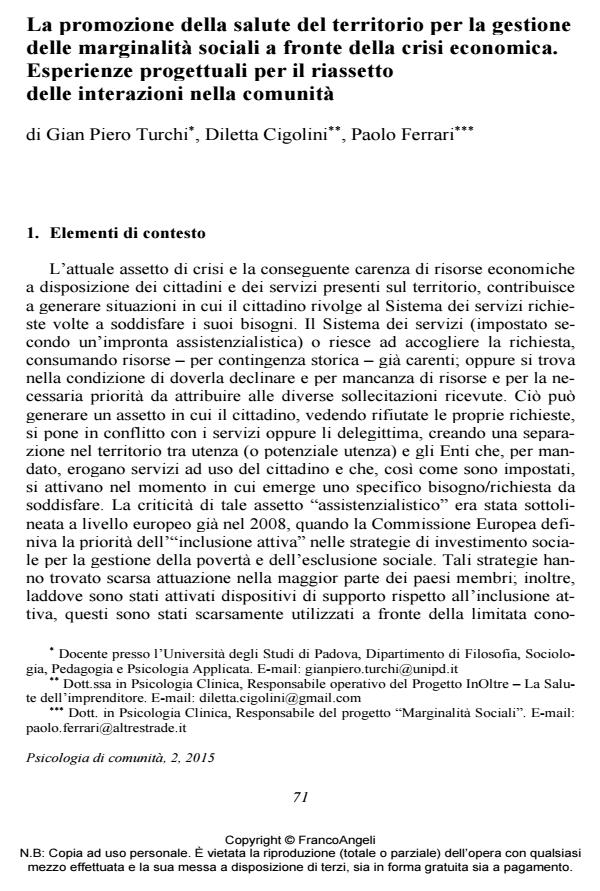Health promotion for the management of social marginalization in the economic crisis. Experiences project for the reorganization of the interactions in the Community
Journal title PSICOLOGIA DI COMUNITA’
Author/s Gian Piero Turchi, Diletta Cigolini, Paolo Ferrari
Publishing Year 2015 Issue 2015/2
Language Italian Pages 11 P. 71-81 File size 67 KB
DOI 10.3280/PSC2015-002006
DOI is like a bar code for intellectual property: to have more infomation
click here
Below, you can see the article first page
If you want to buy this article in PDF format, you can do it, following the instructions to buy download credits

FrancoAngeli is member of Publishers International Linking Association, Inc (PILA), a not-for-profit association which run the CrossRef service enabling links to and from online scholarly content.
Our contribution deals with social marginality in the context of socio-economic changes. The two projects here presented are both focused on the interaction among members of the community (citizens, institutions, public and private societies) and aim at promoting health by building up a team-work. The theoretical-methodological basis of both projects is the Dialogical Science and, in particular, the branch dealing with the "Generative Architecture of Services". The project "Social Marginalities", funded by the municipality of Padua, acts through the promotion of management abilities and active roles by the citizens (versus a passive delegation to social and health services in case of emergencies). On the contrary, the project "inOltre, the health of the entrepreneur", realized by Veneto Region, is primarily addressed to the institutions: the main aims of this project is to promote the creation of networks between services, thus offering a synergic and interlinked support to the users who, in turn, are not passive recipients but can become active protagonists of a team-work aiming at common targets. Our contribution goes on with a critical analysis of the mainadvantages and drawbacks of the two projects and, eventually, it lets to an overall and detailed comment on how to plan and implement interventions addressing specific needs of the Community, thus maximizing their effectiveness and efficiency.
Keywords: Social Marginality, health promotion, entrepreneur, suicidal risk
- Managing the Consequences of Oncological Major Surgery: A Short- and Medium-Term Skills Assessment Proposal for Patient and Caregiver through M.A.D.I.T. Methodology Gian Piero Turchi, Alessandro Fabbian, Rita Alfieri, Anna Da Roit, Salvatore Marano, Genny Mattara, Pierluigi Pilati, Carlo Castoro, Davide Bassi, Marta Silvia Dalla Riva, Luisa Orrù, Eleonora Pinto, in Behavioral Sciences /2022 pp.77
DOI: 10.3390/bs12030077
Gian Piero Turchi, Diletta Cigolini, Paolo Ferrari, La promozione della salute del territorio per la gestione delle marginalità sociali a fronte della crisi economica. Esperienze progettuali per il riassetto delle interazioni nella comunità in "PSICOLOGIA DI COMUNITA’" 2/2015, pp 71-81, DOI: 10.3280/PSC2015-002006